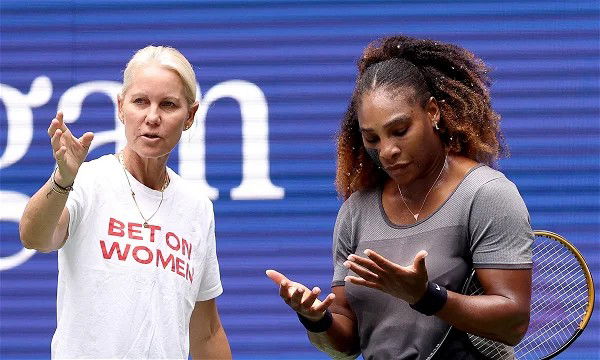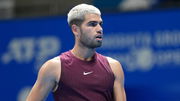

The current scenario of WTA players has seen evident changes in terms of coaching teams. Players like Coco Gauff, Elena Rybakina, Iga Swiatek, and a few others decided to end their long-term partnerships with reliable coaches and immediately hired temporary/permanent coaches. While this was in search of better and more specific guidance, it clearly reveals the crucial role a coach plays behind the players. Amid all this chaos, ITF announced a new on-court coaching rule, which allows coaches to give advice during matches, amplifying a mentor’s presence on the court. To this, Serena Williams‘ ex-coach highlighted a unique “imbalance” that comes with this rule.
Watch What’s Trending Now!
The International Tennis Federation (ITF), the governing body behind the decision, introduced the rule to make tennis “fairer and, potentially, more entertaining.” According to the new guidelines, coaches can provide advice verbally or through hand signals, except during points. In team events, the team captain may also offer coaching, and players are now allowed to access approved analysis technology. Each tournament or event can choose whether to adopt the rule changes, giving flexibility to different competitions worldwide.
Rennae Stubbs, a former world number one in doubles, has recently joined the discussion, sharing her thoughts on the October 23 episode of The Rennae Stubbs Podcast. When asked about the new rule that applies to both ATP and WTA players, Stubbs responded, “Can we just laugh about that?”
ADVERTISEMENT
Discussing her techniques used over the years, Stubbs added, “With on-court coaching it’s like I have played and coached and believe me when I tell you that even when it wasn’t allowed everyone was coaching. I can do a little tip of my righty, it means serve to the forehand. You can cross your arms for cross-court. There are so many ways to get around on-court coaching which are not allowed.”
Rennae Stubbs, who coached Serena Williams during her final grand slam at the 2022 US Open, admitted that coaching has always been a part of tennis, even when it wasn’t officially allowed: “The amount of vitriol and stuff – even John Millman, who I love, was like it sucks. We have had it for like two years already!” Stubbs also acknowledged the imbalance this rule brings.
Particularly for lower-ranked players who may not have access to a coach, she expressed sympathy for them, saying, “So is if you’re a top player you get the practice courts for two hours, and a player ranked 60 gets it for an hour.” Stubbs also gave an apt example of the same while giving an apt example of Arthur Ashe, “You get to hit on Arthur Ashe Stadium every time you play, so it’s not a big deal when you play a match but if you never play a match you are like ‘this court is big’.”
ADVERTISEMENT
She also highlighted that top players already receive significant advantages that all the lower-ranked players might be stripped off. “If you are successful and you are good, everything happens for you, it’s easier. You get more balls, more practice time, you get the private car. All of it.”
The ITF Rules of Tennis will be amended to allow off-court coaching from 1 January 2025.
Full story: https://t.co/h5k3MVg4Qi pic.twitter.com/kCRksWI8eN
— ITF (@ITFTennis) October 21, 2024
ADVERTISEMENT
Despite these concerns, Stubbs believes the new coaching rule doesn’t change much. According to her, coaching has always been a part of the game, and now it’s just being made official. She joked about how coaches found ways to get around the rules, saying, “I think it’s fine because it was happening anyway, so now we don’t have to worry about the stupid warnings.”
While coaching during points remains forbidden, Stubbs pointed out that a coach can only give limited advice in a short amount of time, which may not always help players. “There’s this thing called paralysis by analysis,” she explained, referring to how overloading players with information can sometimes backfire. While the ITF believes the new coaching rule will make tennis more engaging, not all players agree.
ADVERTISEMENT
Besides Serena Williams’ ex-coach, ATP stars also shared their verdict on the new rule
Taylor Fritz, the current world number six, has long sided for preserving the strategic elements of tennis, which he believes are central to the sport’s one-on-one nature. After the rule was announced, Fritz took to X (formerly known as Twitter) to express his frustration, stating, “Can we stop ruining the 1v1 mental/strategic aspect of the sport PLEASE?” His post reflects a broader concern among players who feel that allowing coaches to intervene during matches diminishes the individual mental battle that tennis demands.
Denis Shapovalov shared similar views on the matter. He voiced his disappointment on the same platform as he echoed Fritz’s, “Not just as a tennis player but as a fan of this sport it’s sad to see this new off-court coaching rule,” Shapovalov wrote, highlighting the unique nature of tennis where players are expected to rely solely on their own instincts during matches. He questioned why the governing bodies are changing what he describes as the “beauty of the game,” where players face the pressure alone without external assistance.
Top Stories
Match-Fixing Scandal Erupts in Tennis After Arrests Uncover $821K Scheme

Carlos Alcaraz’s Split With Coach Resulted From ‘Major Disagreements’ With His Father

Carlos Alcaraz Split With Juan Carlos Ferrero After “Unacceptable” Contract Talks Turn Sour

Naomi Osaka Ends Chapter With Longtime Business Partner in Major Off-Court Move

Top 3 Biggest Match Fixing Scandals in Tennis History

While the ITF consulted with various stakeholders to reach this decision, including players, coaches, and umpires, the response from some prominent athletes suggests not everyone feels heard.
ADVERTISEMENT
ADVERTISEMENT
ADVERTISEMENT
ADVERTISEMENT

